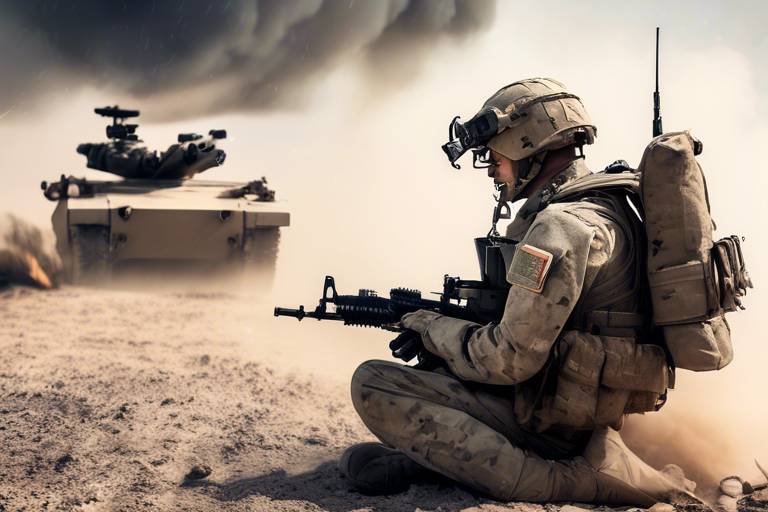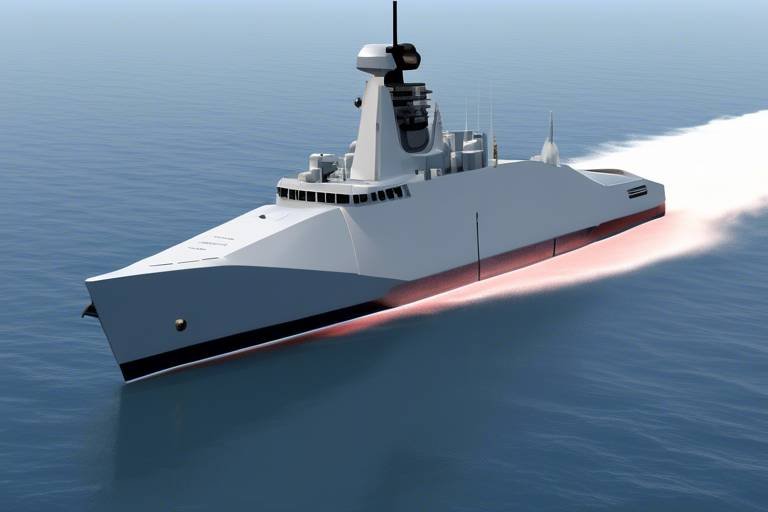The Use of Blockchain Technology in Securing Military Data
In recent years, the world has witnessed a remarkable transformation in technology, and one of the most significant advancements is blockchain technology. Initially popularized by cryptocurrencies, blockchain has emerged as a powerful tool that holds immense potential for enhancing the security of military data. This article delves into how blockchain is revolutionizing the security landscape in defense operations, ensuring that sensitive information is not only secure but also reliable and easily accessible.
Imagine a world where military data is as secure as a vault, impervious to unauthorized access and alterations. This is the promise of blockchain technology. By utilizing a decentralized system, blockchain offers a level of transparency and security that is crucial for military applications. Each piece of data is stored in a block and linked to the previous one, creating a chain of information that is nearly impossible to tamper with. This structure not only enhances data integrity but also fosters trust among military personnel, as they can be confident that the information they are receiving is accurate and unaltered.
One of the most compelling features of blockchain in military contexts is its ability to provide immutable records. This means that once data is recorded on the blockchain, it cannot be changed or deleted. Such a characteristic is vital for military operations where the accuracy of intelligence and operational decisions can mean the difference between success and failure. For example, if a military unit relies on outdated or manipulated intelligence, it could lead to disastrous consequences on the battlefield. With blockchain, every transaction and piece of data is timestamped and verifiable, ensuring that military leaders can make informed decisions based on reliable information.
Moreover, the verification processes facilitated by blockchain technology allow for real-time authentication of data. This means that as information is generated, it can be immediately verified and recorded on the blockchain, providing a clear and trustworthy trail of data. In a military context, this is particularly important when coordinating operations across various units and branches. Imagine the efficiency gained when every piece of intelligence can be verified instantly, enabling swift and accurate decision-making.
Additionally, blockchain enhances communication security within military networks. Traditional communication channels are often vulnerable to interception and cyber threats, putting sensitive information at risk. However, with blockchain, secure channels can be established that minimize these risks. The decentralized nature of blockchain means that there is no single point of failure, making it significantly harder for adversaries to compromise military communications.
In conclusion, the integration of blockchain technology in military data security is not just a trend; it is a necessary evolution in how defense operations manage and protect sensitive information. As we move forward, it is essential to address the challenges that come with implementing this technology while recognizing its immense potential to enhance data integrity, authenticity, and communication security.
- What is blockchain technology?
Blockchain technology is a decentralized digital ledger that records transactions across multiple computers, ensuring that the data cannot be altered retroactively.
- How does blockchain enhance military data security?
Blockchain enhances military data security by providing immutable records, facilitating real-time verification processes, and establishing secure communication channels.
- What are the challenges of implementing blockchain in military operations?
Challenges include integration with existing systems, scalability issues, and the need for specialized training for military personnel.
- What is the future of blockchain in defense?
The future of blockchain in defense looks promising, with potential advancements that could further improve data security and operational effectiveness.

Understanding Blockchain Technology
Blockchain technology is often hailed as a revolutionary force, and for good reason. At its core, blockchain is a decentralized digital ledger that records transactions across many computers in such a way that the registered transactions cannot be altered retroactively. This means that once data is recorded, it is nearly impossible to change it without consensus from the network. Imagine a digital notebook that everyone can see, but no one can erase or alter. This transparency is crucial, especially in military applications where the integrity of information can mean the difference between success and failure.
One of the fundamental principles of blockchain is its decentralization. Unlike traditional databases that are controlled by a single entity, a blockchain operates on a peer-to-peer network. This means that every participant in the network has access to the entire database, and they all work together to validate new transactions. This collective validation process ensures that no single party can manipulate the data for personal gain. In a military context, this could prevent unauthorized access or tampering with sensitive information.
Additionally, blockchain employs a variety of cryptographic techniques to enhance security. Each transaction is encrypted and linked to the previous transaction, forming a chain of blocks—hence the name "blockchain." This cryptographic linking creates a secure and tamper-proof record. To illustrate this, consider the following table that outlines the key components of blockchain technology:
| Component | Description |
|---|---|
| Decentralization | No single point of control; every participant has access to the entire ledger. |
| Transparency | All transactions are visible to authorized users, ensuring accountability. |
| Immutability | Once recorded, data cannot be altered without consensus from the network. |
| Security | Uses cryptographic techniques to secure data and ensure integrity. |
In military applications, these features translate into a robust framework for securing sensitive data. The decentralized nature of blockchain means that even if one part of the network is compromised, the integrity of the entire system remains intact. This is particularly important for military operations where data breaches can have dire consequences.
Furthermore, blockchain technology allows for real-time updates and access to data. This means that military personnel can make decisions based on the most current information available, enhancing operational efficiency. In a world where information is power, being able to access accurate and timely data can significantly improve strategic planning and execution.
In conclusion, understanding blockchain technology is essential for recognizing its potential impact on military data security. Its decentralized, transparent, and secure nature makes it an ideal candidate for protecting sensitive information in defense operations. As we delve deeper into the benefits and challenges of implementing this technology, the importance of its foundational principles will become even more apparent.
- What is blockchain technology? Blockchain is a decentralized digital ledger that records transactions securely and transparently.
- How does blockchain enhance security? By using cryptographic techniques and a decentralized network, blockchain ensures that data cannot be altered without consensus.
- Why is blockchain important for military applications? It provides enhanced data integrity, security, and operational efficiency, which are critical in defense operations.
- Can blockchain be integrated with existing military systems? While challenging, integration is possible with careful planning and specialized training.

Benefits of Blockchain in Military Security
As the world becomes increasingly reliant on technology, the military sector is no exception. The integration of blockchain technology into military operations is not just a trend; it’s a necessary evolution. Imagine a world where every piece of military data is not only secure but also easily verifiable and immutable. This is the promise that blockchain holds. By leveraging its decentralized nature, the military can enhance security measures, ensure data integrity, and improve operational efficiency.
One of the standout features of blockchain is its ability to create a secure environment for sensitive information. In an age where cyber threats are a constant concern, the military must adopt robust systems to protect its data. Blockchain offers a unique solution by providing a distributed ledger that records transactions across multiple nodes. This means that even if one node is compromised, the integrity of the entire system remains intact. The decentralized nature of blockchain significantly reduces the risk of data tampering and unauthorized access.
Moreover, the implementation of blockchain can lead to enhanced data integrity. With traditional systems, data can be altered or deleted, leading to potential misinformation and compromised decision-making. However, blockchain’s immutable ledger ensures that once data is recorded, it cannot be changed or erased. This is particularly crucial in military operations where accurate and reliable information can mean the difference between success and failure. The ability to trust the authenticity of data fosters confidence among military personnel, allowing them to make informed decisions based on solid evidence.
In addition to data integrity, blockchain also facilitates real-time verification processes. Imagine the efficiency gained when military personnel can instantly verify the authenticity of intelligence reports or operational data. With blockchain, every transaction is time-stamped and recorded in a way that is easily accessible for verification. This not only speeds up decision-making processes but also enhances accountability within military operations. Each piece of data can be traced back to its origin, ensuring that all information is reliable and trustworthy.
The benefits of blockchain extend to communication security as well. In military operations, secure communication channels are paramount. Blockchain technology can create encrypted pathways for information exchange, significantly reducing the risk of interception by adversaries. By utilizing blockchain, military networks can ensure that sensitive communications remain confidential and protected from cyber threats. This level of security is invaluable, especially in high-stakes environments where every piece of information is critical.
Furthermore, the operational efficiency gained through blockchain cannot be overlooked. By streamlining data management processes, the military can reduce the time spent on administrative tasks and focus more on core operations. The automation of data verification and record-keeping allows military personnel to allocate their resources more effectively, ultimately enhancing overall mission success.
In summary, the integration of blockchain technology in military security offers a plethora of benefits. From enhanced data integrity and secure communications to improved operational efficiency, the advantages are clear. As the military continues to evolve in the face of modern challenges, embracing blockchain could be a pivotal step towards achieving a more secure and effective defense framework.
- What is blockchain technology? Blockchain is a decentralized digital ledger that records transactions across multiple computers, ensuring that the data is secure and immutable.
- How does blockchain enhance military security? It provides a secure environment for data management, ensures data integrity, facilitates real-time verification, and enhances communication security.
- What are the challenges of implementing blockchain in the military? Challenges include integration with existing systems, scalability issues, and the need for specialized training.
- Can blockchain prevent cyber attacks? While it significantly reduces the risk of unauthorized access and tampering, it is not a foolproof solution against all cyber threats.

Data Integrity and Authenticity
The importance of data integrity and authenticity in military operations cannot be overstated. In an environment where every piece of information can influence critical decisions, ensuring that data is both accurate and unaltered is paramount. This is where blockchain technology shines, offering a revolutionary approach to maintaining the integrity of military data. By utilizing an immutable ledger, blockchain guarantees that once data is recorded, it cannot be changed or tampered with, providing a level of trust that traditional systems simply cannot match.
Imagine a scenario where military intelligence reports are shared across various units. With traditional systems, there is always a risk that these reports could be altered during transmission, leading to potentially disastrous consequences. However, with blockchain, every piece of data is time-stamped and linked to its previous entry, creating a transparent trail of information that can be audited at any time. This transparency not only enhances trust among personnel but also ensures that decisions are based on reliable and verified data.
Moreover, the verification processes enabled by blockchain technology are game-changers. Each transaction or data entry is verified by multiple nodes in the network before it is added to the blockchain. This means that any attempt to alter the data would require the consensus of the majority of the network, making unauthorized changes nearly impossible. As a result, military leaders can have confidence in the authenticity of the information they are receiving, which is crucial for operational success.
In addition, the use of smart contracts within blockchain systems can automate verification processes. For instance, a smart contract could be programmed to automatically validate the credentials of personnel accessing sensitive data, ensuring that only authorized users can view or modify critical information. This not only streamlines operations but also adds an extra layer of security to military communications.
To summarize, the integration of blockchain technology into military data management systems offers a robust solution for ensuring data integrity and authenticity. It provides an immutable record of transactions, enhances verification processes, and ultimately builds trust in military operations. As we continue to explore the potential of blockchain in defense applications, it is clear that its ability to safeguard data will play a pivotal role in the future of military operations.
- What is data integrity in military operations?
Data integrity refers to the accuracy and consistency of data throughout its lifecycle. In military operations, it is essential that the data used for decision-making is reliable and unaltered.
- How does blockchain ensure data authenticity?
Blockchain ensures data authenticity by creating an immutable ledger where every transaction is verified and time-stamped, making it nearly impossible to alter data without detection.
- Can blockchain technology be integrated with existing military systems?
While there are challenges in integration, solutions such as middleware and phased implementation strategies can help incorporate blockchain technology into existing military infrastructures.

Immutable Ledger
The concept of an is one of the cornerstones of blockchain technology, and it plays a pivotal role in the realm of military data security. Imagine a digital notebook that cannot be erased or altered; once you write something down, it stays there forever, untouched by anyone. This is essentially how an immutable ledger functions within a blockchain. Each transaction or piece of data is recorded in a block, and once that block is added to the chain, it becomes part of a permanent record. This immutability is crucial for military operations, where the integrity of data can mean the difference between success and failure.
With military data, the stakes are incredibly high. Any unauthorized alteration or tampering could lead to disastrous consequences, such as misinformed decisions or compromised missions. The immutable ledger ensures that all records are accurate and trustworthy. This is achieved through a consensus mechanism, where multiple nodes in the blockchain network validate each transaction before it is added to the ledger. This decentralized verification process significantly reduces the risk of fraud and manipulation, as it would require an attacker to alter the data on every single node to change the information successfully.
Furthermore, the transparency offered by an immutable ledger allows for enhanced accountability. In military operations, knowing who accessed what information and when can be vital for maintaining operational security. Each change or addition to the ledger is time-stamped and attributed to a specific user, creating an auditable trail that can be reviewed if any discrepancies arise. This transparency fosters trust among personnel and ensures that everyone is operating from the same set of verified information.
In a practical sense, the implementation of an immutable ledger can be illustrated through the following table:
| Feature | Description |
|---|---|
| Data Integrity | Ensures that once data is recorded, it cannot be altered or deleted, preserving its original state. |
| Decentralization | Data is stored across multiple nodes, making it resistant to single points of failure or attacks. |
| Transparency | All transactions are visible to authorized users, promoting accountability and trust. |
| Real-time Updates | Changes are reflected across the network immediately, ensuring all users have access to the latest information. |
In conclusion, the immutable ledger is not just a technical feature; it is a fundamental aspect of how blockchain technology can revolutionize military data management. By providing a secure, transparent, and unchangeable record of all transactions, it enhances the overall security framework within which military operations are conducted. As we move forward, the importance of this feature will only grow, making it an essential component in the future of military technology.
- What is an immutable ledger? An immutable ledger is a record-keeping system where once data is entered, it cannot be changed or deleted, ensuring the integrity of the information.
- How does blockchain ensure data integrity? Blockchain uses a consensus mechanism where multiple nodes validate transactions before they are added to the ledger, making it nearly impossible to alter past records.
- Why is transparency important in military operations? Transparency fosters accountability and trust among personnel, ensuring that all members operate from verified and accurate information.
- Can blockchain technology be hacked? While no system is entirely immune to attacks, the decentralized nature of blockchain makes it significantly more secure than traditional data storage methods.

Verification Processes
The verification processes enabled by blockchain technology represent a significant leap forward in ensuring the authenticity and reliability of military data. Imagine a world where every piece of information is not only recorded but also verified through a transparent and decentralized system. This is precisely what blockchain offers. By utilizing cryptographic techniques, each transaction or data entry is meticulously verified before it is added to the blockchain, creating a secure chain of trust. This means that any data related to military operations, intelligence reports, or logistical information can be traced back to its origin, ensuring that it has not been tampered with or altered in any way.
In military operations, where the stakes are incredibly high, the need for accurate and trustworthy information cannot be overstated. Blockchain technology facilitates real-time verification processes that are crucial for decision-making. When a new data entry is made, it undergoes a rigorous validation process involving multiple nodes within the network. Each node checks the data against its own records, and only when there is consensus is the data added to the blockchain. This decentralized approach minimizes the risk of errors and fraud, as no single entity has control over the entire system. It’s like having a team of watchdogs that ensure every piece of information is legitimate before it can be used in critical operations.
Moreover, the verification processes help to create an audit trail that is invaluable for military accountability and transparency. Should there be a need to investigate a particular operation or decision, the immutable nature of blockchain allows for easy access to historical data. Each entry is time-stamped and linked to previous entries, creating a comprehensive record that can be reviewed without the fear of alterations. This feature not only enhances trust among military personnel but also builds confidence in the systems used to manage sensitive data.
In summary, the verification processes provided by blockchain technology are a game-changer for military operations. They ensure that every piece of data is authentic, reliable, and traceable, which is essential for making informed decisions in high-pressure situations. With the ability to maintain data integrity and prevent unauthorized alterations, blockchain stands as a formidable ally in the quest for secure military communications and operations.
- What is blockchain technology? Blockchain is a decentralized digital ledger that records transactions across many computers in a way that ensures the registered transactions cannot be altered retroactively.
- How does blockchain enhance military data security? It provides an immutable record of data, ensuring that all information is accurate and unaltered, which is crucial for maintaining trust in military operations.
- What are the challenges of implementing blockchain in the military? Some challenges include integration with existing systems, scalability issues, and the need for specialized training for personnel.
- Can blockchain technology be scaled for large military operations? Yes, but it requires strategic planning and development to enhance its capacity to handle vast amounts of data.

Enhanced Communication Security
In today's digital battlefield, the security of communication channels is paramount. Military operations rely heavily on the swift and secure exchange of information, where any breach can lead to catastrophic consequences. Blockchain technology emerges as a game-changer in this arena, providing a robust framework that enhances communication security. By utilizing a decentralized network, blockchain ensures that data transmitted between military personnel remains confidential and tamper-proof. Imagine sending a message that is locked in a vault, accessible only to those with the right key—this is the essence of blockchain's secure communication capabilities.
One of the standout features of blockchain technology is its ability to create secure channels for communication. Unlike traditional systems that can be vulnerable to hacking and interception, blockchain employs cryptographic techniques that encrypt data before it is sent. This means that even if a malicious actor attempts to intercept the communication, all they would get is an unintelligible string of characters. In essence, blockchain transforms sensitive military communications into a coded language that only authorized personnel can decipher.
Additionally, the decentralized nature of blockchain eliminates the single point of failure that often plagues conventional communication systems. In a traditional setup, if one server is compromised, the entire network is at risk. However, with blockchain, information is distributed across multiple nodes, making it incredibly difficult for attackers to gain control over the entire system. This decentralization not only enhances security but also increases resilience against cyber threats, ensuring that military operations can continue uninterrupted even in the face of potential attacks.
Moreover, the implementation of smart contracts within blockchain can automate and secure communication protocols. For example, a smart contract could automatically verify the identity of personnel before allowing access to sensitive information. This level of automation reduces human error and ensures that only those with the appropriate clearance can engage in critical communications. To put it simply, smart contracts act as digital gatekeepers, ensuring that every interaction is legitimate and secure.
To further illustrate the benefits of enhanced communication security through blockchain, consider the following table:
| Feature | Traditional Communication | Blockchain Communication |
|---|---|---|
| Data Encryption | Often vulnerable to interception | Strong cryptographic encryption |
| Centralized Control | Single point of failure | Decentralized and resilient |
| Verification Process | Manual and prone to errors | Automated with smart contracts |
| Access Control | Limited by traditional permissions | Dynamic and role-based access |
In conclusion, the integration of blockchain technology into military communication systems not only fortifies security but also enhances operational efficiency. With the ability to encrypt data, decentralize control, and automate verification processes, blockchain stands as a formidable ally in safeguarding sensitive military communications. As we continue to navigate the complexities of modern warfare, embracing such innovative technologies will be crucial in maintaining an edge over adversaries.
- What is blockchain technology? Blockchain is a decentralized digital ledger that records transactions across multiple computers, ensuring that the recorded data cannot be altered retroactively.
- How does blockchain enhance military communication security? By encrypting data and decentralizing communication channels, blockchain reduces the risk of interception and unauthorized access.
- What are smart contracts? Smart contracts are self-executing contracts with the terms of the agreement directly written into code, allowing for automated verification and execution of communication protocols.
- Can blockchain be integrated with existing military systems? While there are challenges, blockchain can be integrated with existing systems through careful planning and adaptation to ensure compatibility.

Challenges in Implementing Blockchain
While the potential of blockchain technology to revolutionize military data security is immense, the journey to its implementation is fraught with challenges. One of the most pressing issues is the integration with existing systems. Military infrastructures are often built on legacy systems that have been in place for years, if not decades. The notion of introducing a decentralized system like blockchain can be daunting. It requires a comprehensive understanding of both the current systems and the blockchain technology itself. This integration process can lead to significant operational disruptions if not managed properly.
Moreover, the scalability issues associated with blockchain cannot be overlooked. Military operations generate vast amounts of data daily, and the blockchain must be capable of handling this influx without compromising performance. As the volume of transactions increases, the network can slow down, leading to delays in data processing. This is particularly critical in military operations where timely information can mean the difference between success and failure. Addressing these scalability challenges requires innovative solutions and potentially the development of new blockchain frameworks tailored for military needs.
Another challenge is the need for specialized training. Implementing a new technology like blockchain demands a workforce that is not only familiar with its mechanisms but also understands its implications for security and operational efficiency. This means investing in training programs and possibly hiring new personnel with the requisite expertise. The transition period can be resource-intensive, both in terms of time and finances, which can deter military organizations from adopting blockchain technology.
In addition to these operational challenges, there are also regulatory and compliance hurdles that must be navigated. Military data is subject to strict regulations, and any new technology must comply with these standards to ensure national security. This can slow down the adoption of blockchain as military organizations seek to align the technology with existing legal frameworks. Furthermore, there is a need for ongoing assessments and audits to ensure that the implementation of blockchain does not inadvertently expose sensitive data to new vulnerabilities.
Lastly, the cultural shift required for blockchain adoption can be significant. Military organizations are typically hierarchical and risk-averse, making the transition to a decentralized model a challenge. It requires a change in mindset, where personnel must trust a system that operates on transparency and collective verification rather than traditional top-down control. This cultural shift can be one of the most challenging aspects of implementing blockchain technology in military settings.
In summary, while blockchain technology holds great promise for enhancing military data security, its implementation is not without challenges. From integration issues to scalability, training needs, regulatory compliance, and cultural shifts, military organizations must navigate a complex landscape to leverage the full potential of this transformative technology.
- What are the main challenges in implementing blockchain in the military? The main challenges include integration with existing systems, scalability issues, the need for specialized training, regulatory compliance, and cultural shifts within military organizations.
- How can military organizations overcome integration challenges? By conducting thorough assessments of current systems, seeking expert consultation, and implementing phased integration strategies, organizations can mitigate integration risks.
- What is the significance of scalability in military blockchain applications? Scalability is crucial because military operations generate vast amounts of data that need to be processed quickly and efficiently. A scalable blockchain solution ensures that data handling does not slow down operational effectiveness.
- Why is specialized training important for blockchain implementation? Specialized training ensures that personnel understand how to use blockchain technology effectively, which is essential for maximizing its benefits and ensuring security.

Integration with Existing Systems
Integrating blockchain technology into existing military systems is akin to fitting a new engine into a vintage car. While the potential for enhanced performance is enormous, the challenges of seamless integration cannot be overlooked. Military infrastructures, often built on legacy systems, require careful planning and execution to incorporate blockchain solutions effectively. The first step in this journey involves assessing the current technological landscape. This means identifying which systems are critical for operations and determining how blockchain can complement or replace these existing frameworks.
One of the primary hurdles is the incompatibility between traditional databases and blockchain's decentralized nature. Traditional systems are often centralized, relying on a single point of control, which can lead to vulnerabilities. In contrast, blockchain operates on a distributed ledger, where data is replicated across multiple nodes. This fundamental difference necessitates a comprehensive strategy for transition. Military organizations must explore hybrid models that allow for both systems to coexist during the migration process. This can be achieved through the use of APIs (Application Programming Interfaces) that facilitate communication between the two systems, ensuring that data flows smoothly and securely.
Moreover, training personnel to understand and operate within a blockchain framework is crucial. Imagine trying to teach an old dog new tricks; it requires patience and persistence. Military staff accustomed to traditional data management systems will need specialized training to adapt to the nuances of blockchain. This includes understanding how to interact with smart contracts, manage cryptographic keys, and utilize blockchain-based applications effectively. Investing in this training is essential to maximize the benefits of blockchain technology.
Another significant factor to consider is the regulatory environment. Military operations are governed by strict protocols and regulations that dictate how data is handled. Any new technology must comply with these regulations to ensure operational integrity and security. Collaborating with legal and compliance teams during the integration process can help navigate these complexities and mitigate risks associated with non-compliance.
In summary, while the integration of blockchain technology into existing military systems presents challenges, it also offers a pathway to enhanced security and efficiency. By carefully evaluating current systems, investing in training, and ensuring regulatory compliance, military organizations can successfully embrace this transformative technology. The journey may be complex, but the potential rewards—improved data integrity, enhanced security, and streamlined operations—are well worth the effort.
- What are the main challenges in integrating blockchain with military systems?
Challenges include incompatibility with legacy systems, the need for specialized training, and ensuring compliance with regulatory requirements. - How can military personnel be trained to use blockchain technology?
Training can be provided through specialized courses focusing on blockchain fundamentals, smart contracts, and data management. - What benefits does blockchain offer to military data security?
Blockchain provides enhanced security through decentralized data management, immutable records, and real-time verification processes. - Can blockchain technology coexist with traditional military systems?
Yes, through hybrid models and APIs, blockchain can be integrated with existing systems while maintaining operational continuity.

Scalability Issues
When we talk about scalability in the context of blockchain technology, especially within the military sphere, we're diving into a complex web of challenges that can hinder its widespread adoption. Imagine a bustling highway during rush hour—if too many vehicles try to use it at once, traffic grinds to a halt. Similarly, blockchain networks can face bottlenecks when handling vast amounts of data, which is a common occurrence in military operations. The sheer volume of sensitive information that needs to be processed and stored can overwhelm existing blockchain infrastructures, leading to delays and inefficiencies.
One of the primary issues is the transaction speed. In military scenarios, decisions often need to be made in real-time, and if the blockchain cannot process transactions quickly enough, critical operations could be compromised. For instance, if a military unit is relying on blockchain to verify the authenticity of intelligence reports, any lag in processing could lead to outdated or incorrect information being acted upon. This is not just a theoretical concern; the stakes are incredibly high when national security is on the line.
Additionally, the storage capacity of blockchain can be a limiting factor. Each block in a blockchain is filled with data, and as more blocks are added, the size of the blockchain grows. This can lead to substantial storage requirements, which, in a military context, can become unwieldy. Imagine trying to store years of operational data on a single server; it’s not just impractical, it’s a security risk. If a blockchain solution cannot efficiently manage and store data, it risks becoming obsolete before it even gets off the ground.
Moreover, there are concerns regarding the interoperability of blockchain systems with existing military technologies. The military already employs a myriad of systems for communication, logistics, and intelligence. Integrating a new blockchain solution into this existing framework can be a daunting task. If a blockchain system cannot easily connect and communicate with other systems, it risks becoming a silo, which defeats the purpose of enhancing operational efficiency.
To tackle these scalability issues, the military could explore various strategies, such as:
- Layer 2 Solutions: These are secondary frameworks built on top of the main blockchain to increase transaction speed and reduce congestion.
- Sharding: This involves breaking up the blockchain into smaller, more manageable pieces, allowing for parallel processing and improved efficiency.
- Hybrid Models: Combining public and private blockchains could offer the flexibility needed to manage sensitive military data while still benefiting from the transparency of public networks.
In summary, while blockchain technology holds immense potential for enhancing military operations, its scalability issues pose significant challenges that need to be addressed. As military organizations continue to explore the integration of blockchain, it will be crucial to develop solutions that not only enhance data security but also ensure that the technology can grow and adapt to the ever-evolving landscape of defense operations.
- What are the main scalability issues with blockchain technology in military applications? The main issues include transaction speed, storage capacity, and interoperability with existing systems.
- How can scalability issues be addressed? Solutions such as layer 2 solutions, sharding, and hybrid models can help improve scalability.
- Why is scalability important for military blockchain applications? Scalability is crucial because military operations often require real-time data processing and efficient handling of large volumes of sensitive information.

Future Prospects of Blockchain in Defense
The future of blockchain technology in defense is not just a fleeting trend; it's shaping up to be a cornerstone of military operations in the coming years. As we look ahead, the integration of blockchain could revolutionize how military organizations manage and protect their data. Imagine a world where every piece of intelligence, every operational decision, and every communication is secured by an unbreakable chain of blocks, making it nearly impossible for adversaries to tamper with or steal sensitive information. Sounds futuristic, right? But it's closer than we think.
One of the most promising aspects of blockchain in defense is its ability to facilitate interoperability among various military branches and allied nations. Currently, different military systems often operate in silos, making collaboration difficult. However, blockchain can create a unified framework that allows for secure data sharing across platforms, enhancing joint operations and intelligence sharing. This can lead to quicker response times and more effective strategies on the battlefield.
Moreover, advancements in smart contracts could streamline procurement processes within the military. These self-executing contracts can automate various tasks, from supply chain management to personnel records, reducing the need for intermediaries and minimizing human error. Picture a scenario where a soldier's equipment is automatically updated and verified upon delivery, ensuring they have the right gear without any delays. This level of efficiency can significantly enhance operational readiness.
As we explore the future, we must also consider the role of artificial intelligence (AI) in conjunction with blockchain technology. AI algorithms can analyze vast amounts of data secured by blockchain, providing actionable insights and predictive analytics that can inform military strategies. For instance, AI could identify patterns in enemy movements based on immutable data records, allowing for preemptive actions that could save lives and resources.
However, with great potential comes great responsibility. The military must address several challenges to fully harness the power of blockchain. Issues such as regulatory compliance, data privacy, and the need for robust cybersecurity measures will be paramount. As military operations become increasingly reliant on digital platforms, ensuring that blockchain systems are resilient against cyber threats will be crucial. This means investing in not just technology, but also in training personnel to understand and manage these advanced systems effectively.
In summary, the future prospects of blockchain in defense are bright, filled with opportunities for enhanced security, efficiency, and collaboration. As military organizations continue to explore and implement this groundbreaking technology, we can expect to see a transformation in how data is managed and protected. The question remains: are we ready to embrace this change and lead the way into a new era of military operations?
- What is blockchain technology?
Blockchain is a decentralized digital ledger that records transactions across many computers securely, ensuring that the information cannot be altered retroactively.
- How can blockchain improve military operations?
By providing enhanced security, data integrity, and improved communication channels, blockchain can streamline operations and protect sensitive military information.
- What challenges does blockchain face in the military?
Challenges include integration with existing systems, scalability for large data volumes, and the need for specialized training for personnel.
- What role does AI play in blockchain for defense?
AI can analyze data secured by blockchain to provide insights and predictive analytics, improving decision-making and operational strategies.
Frequently Asked Questions
- What is blockchain technology?
Blockchain technology is a decentralized digital ledger that records transactions across many computers. This ensures that the recorded transactions cannot be altered retroactively, providing a secure and transparent way to manage data.
- How does blockchain enhance military data security?
Blockchain enhances military data security by providing an immutable ledger, which means that once data is recorded, it cannot be changed or deleted. This feature helps maintain the integrity and authenticity of sensitive information, making it crucial for military operations.
- What are the key benefits of using blockchain in military operations?
The key benefits of using blockchain in military operations include improved data integrity, enhanced security for communications, and increased operational efficiency. These advantages help ensure that military personnel can rely on accurate information when making critical decisions.
- What challenges does blockchain face in military applications?
Some challenges include integrating blockchain with existing military systems, scalability issues when handling large volumes of data, and the need for specialized training for personnel to effectively use the technology.
- Can blockchain technology improve communication security in the military?
Absolutely! Blockchain provides secure channels for communication, significantly reducing the risk of data interception and cyber threats, which is vital for maintaining operational security in military networks.
- What does the future hold for blockchain in defense?
The future of blockchain in defense looks promising, with potential advancements that could further enhance data security, streamline operations, and improve the overall effectiveness of military strategies. Innovations in this field are likely to continue evolving.



















